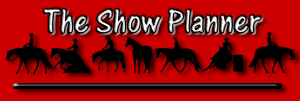The Expectant Mare
Mark A. Wallace, DVM, MS,
Diplomate ACVIM (LA)
Reidsville Veterinary Hospital
Reidsville, North Carolina
Well, its finally springtime and many new foals have already hit the ground. For those of you who have pregnant mares who have yet to foal, there are a few considerations to ensure the health and well being of the expectant broodmare.
The average gestation for horses is about 340 days or so (although there is actually a very wide possible range: 320-380 days). During the first 7 months of pregnancy, mares can be treated pretty much the same as normal , with moderate riding and no changes in the feeding program. Good quality forage should make up the bulk of a balanced diet, with generally little need for vitamin supplementation. Standard vaccinations, regular hoof care and routine deworming can proceed like normal during this time. Vaccinations for local diseases (such as tetanus, eastern equine encephalitis (EEE), influenza, rabies, etc.) should be kept current throughout the pregnancy with boosters done approximately 1 month before the expected foaling time. These boosters will ensure that the mare's colostrum (first milk) will have plenty of those antibodies to pass along to the newborn foal. In addition, vaccination (Pneumabort-K) for herpes virus abortion (equine rhinopneumonitis) should be done at 3, 5, 7 and 9 months of gestation.
During the last 3 or 4 months of pregnancy the mare's energy needs will slowly increase due to the rapid growth of the foal during this time. Good quality hay and forage should continue to make up the bulk of the diet with concentrates (grain) added only as necessary to maintain optimal body condition. Vigorous exercise is not recommended during this time.
During the last 3 months of pregnancy mares should be taken off of fescue grass and fescue hay in order to avoid fescue toxicity. Fescue toxicity is caused by the presence of an endophyte fungus that grows on tall fescue plants. This fungus is very common in our area and tall fescue is the most widely grown forage grass in the United States. Problems caused by this endophyte include lack of milk, difficult delivery, abortion, prolonged gestation, foal death and difficulty in predicting the timing of birth.
Okay, so the mare has made it to the final stretch. What can we watch for to help determine when she will finally foal? The udder should begin to slowly fill 2 to 4 weeks before foaling. The teats themselves should begin to distend a few days ahead of time and waxing should occur 1 to 4 days prior to foaling (waxing is a yellowish, honey-like secretion from the teats). Additional signs include dripping of milk, softening of muscles in the croup with the tailhead becoming more prominent, relaxation of the vulva, visible changes in the position of the foal and anxiousness of the mare. Despite careful watching for all these signs, predicting the exact time of foaling can be difficult (and
nerve-racking).

© 2000 - 2010 Show Horse Promotions
All Rights Reserved
Privacy Statement

The Show Horse Promotions web site is an informational web site, this information is subject to change without notice. Any use of, or actions taken based upon any of the information contained on this web site is done entirely at your own risk.
Show Horse Promotions expressly prohibit you from republishing or redistributing this content without first receiving
our written consent. By using this site, you agree not to hold us liable for
any errors or delays in this content, or for any actions that you take in reliance thereon. This site contains links
to other Internet sites. These links are not endorsements by us of any products or services in those sites, and we have not
endorsed or approved any information in those
sites.
